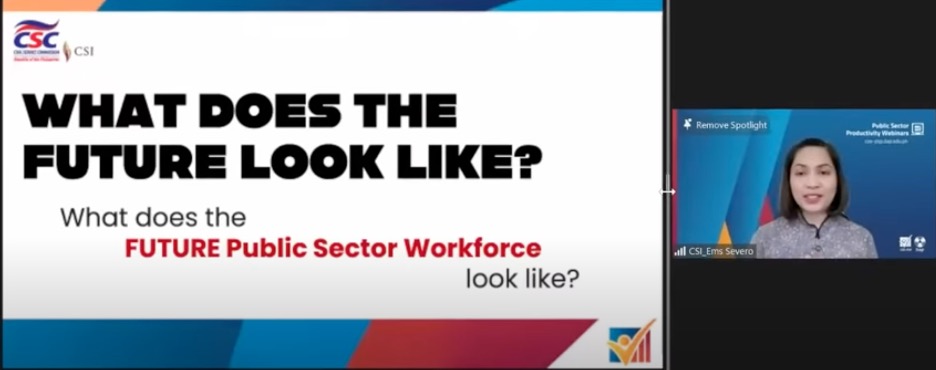
The future is uncertain, and governments need to be abreast with the emerging trends that can affect the future of work in the public sector. Equipping the public-sector workforce is necessary for government agencies to manage and adapt through ambiguous situations.
In her talk during the Envisioning the Future Civil Servants; Shaping Public-Sector Productivity session of the Human Capital Development as a Driver in Improving Public-Sector Productivity webinar series, Director Emilyn Severo of the Civil Service Commission (CSC) identified six major trends that will shape the public-sector workforce for the future:
- Digital Transformation: This trend involves embracing digital tools and technologies to modernize government operations. It includes using data-driven decision-making and innovative solutions to improve public service delivery. The goal is to make government agencies more efficient, transparent, and responsive to the needs of the public. For example, the CSC is creating an ICT office to oversee IT programs and has implemented digital platforms like a knowledge management portal and a centralized customer feedback system.
- Diversity and Inclusion: This trend recognizes the importance of creating diverse and inclusive workplaces within government organizations. It promotes gender and development initiatives, addresses sexual harassment cases, and focuses on gender mainstreaming. By prioritizing diversity and inclusion, government agencies can better adapt to the changing and interconnected world and ensure equal opportunities for all.
- Remote Work: The COVID-19 pandemic has accelerated the shift toward remote work. The future of work is expected to be more hybrid, combining office and remote work. Remote work offers several advantages, including the continuity of public service delivery during emergencies, cost savings from reduced office space and commuting expenses, improved work-life balance, and enhanced health and safety protection. With regard to remote work, the CSC has issued policies on flexible work arrangements to support remote work while promoting productivity.
- Resilience and Dynamism: Resilience is the ability to recover from adversity, such as crises or shocks. Government employees need to be resilient to overcome challenges in their work (e.g., dealing with demanding customers or meeting tight deadlines). Dynamism involves adapting to change, given the constantly evolving world. To foster resilience and dynamism, the CSC organizes events such as the Public Sector Human Resource (HR) Symposium focusing on these qualities.
- Adaptive Leadership. Adaptive leadership is a key competency required for navigating the complexities of a rapidly changing world. Government leaders must respond to crises, address emerging issues, and lead with resilience and innovation. The CSC offers leadership series and webinars on adaptive leadership to equip government leaders with the necessary skills.
- Lifelong Learning. In an era of rapid technological advancement, government employees must continually update their skills and knowledge. Lifelong learning is essential to remain effective and responsive to citizens’ needs. The CSC has launched a Learning Management System (LMS) to facilitate continuous learning and offers e-learning courses for government employees. This commitment to lifelong learning ensures that government workers can access training and development resources to stay current and improve their skills.
Collaboration is key
CSC, which serves as the central human resource institution of the Philippine Government, has an important role in preparing the Philippine bureaucracy toward a forward-looking future. While the CSC fulfills its mandate, the institution should not solely implement human capital development programs, as this should also be the mission of every government agency, every government leader, and every government employee in the Philippines. Collaboration is key for the Philippine bureaucracy to prepare its workforce to the fast-changing circumstances.
The identified trends emphasize the need for government agencies and employees to be flexible, responsive, and innovative in a rapidly changing world. By embracing these trends, government organizations can better serve their constituents and adapt to future challenges.
Watch the full webinar here.
